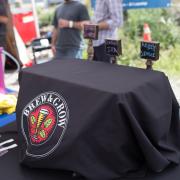So because I don't have a life, I went ahead and read the chicago water reports and am starting to adjust ph using acid malt as a percentage of grist.
Anyone have any experience with doing ph adjustments on ultra-pale beers using the brewhouse tap water? I'm currently using 3% for a west coast style IPA, but I"m really just eyeballing it at this point. How much do you guys recommend using and how far can I push the acid before it starts to negatively effect the beer?











1% malt generally acidifies the pH by 0.1 when you're in the 5.0-5.5 range (the pH scale being logarithmic, this isn't a linear equation).
3% should be a good starting point (and undetectable in the final beer*) with our water, but you may need additional water chemistry to really get the overall mash pH down to 5.2-5.3 range. I like to always add a Ca2+ source to Chicago water, not just for further acidification, but also for yeast health. Whether that's in the form of sulfate or chloride will be up to the recipe you're going for. With an IPA, you'll fall more in the sulfate category. You'll also want to acidify the sparge water (I use the 88% lactic you can get at a homebrew shop).
*I don't have any personal experience, but I'd probably top out the overall acid malt to ~5%.
I do all my calculations with the Bru'n Water spreadsheet. I used the water report I had at my old apartment, even with the brewhouse water, and find it to still be pretty accurate. I'll get those numbers up (as a guide) when I get home tonight.
Yes kyle, I noticed in the report that the calcium levels of Chicago water fell to the lower end of the range, with most books recommending between 75-150mg/L, and my report showing 40 mg/L (which I hope are the numbers you are seeing too).
I'll look into adding calcium sulfate for my session today, but it seems that you need to add a LOT of sulfate given the level of sulfate in the Chicago water.
Anyhoo, according to the internet, 1 gram Gypsum contributes 67 mg/L of Calcium and 147 mg/L of SO4- per gallon of water. Does this mean for my batch today, I would conceivably use 5 grams of Gypsum added to the boil so that my final 5 gallon batch size comes out with some extra calcium and sulfate?
What is the point of acidifying the sparge water? Is it to further inhibit tannin extraction during fly sparge?
Ya know, I never really thought too deeply about why I was acidifying the sparge water. I suppose to just lock in that mash pH, but you're right - I don't fly sparge, so I doubt there's a large risk of running high. If you are fly sparging, it's a small step to take (imo).
Oops, edited the post directly after you replied. I'll repost my edit here:
Anyhoo, according to the internet, 1 gram of Gypsum contributes 67 mg/L of Calcium and 147 mg/L of SO4- per gallon of water. Does this mean for my batch today, I would conceivably use 5 grams of Gypsum added to the boil so that my final 5 gallon batch size comes out with some extra calcium and sulfate?
I use lactic acid in small quantities on all pale beers. Has not been a problem for me. I hear there is some issue with consistency in acidulated malt but that could be an old wives tale from the 90s when all malt was less consistent.
You should not acidify the sparge water but you do want to acidify the kettle in a quantity to make up for the volume of final water. ie you acidify 3.5 gallons of water for the mash, you need 5.5 more gallons for the sparge to get your preboil volume to 7.5 gallons. You should add acid to the kettle in a quantity that would be appropriate for acidifying 5.5 gallons.
This is a pretty standard water schedule for pilsners and lagers for a 5 gallon batch. I use CaCl not gypsum in most beers that balanced malt/hop profile or are malt dominated.
Mash
2g CaCl
1g Epsom Salt
1.5ml Lactic
Kettle (essentially adjusting the sparge water after it has been sparged already as the minerals will not have time to dissolve and equalize in the mash. It is generally for flavor, yeast health, and final beer ph)
3g CaCl
2g Epsom Salt
2.5ml Lactic
I pH balance all of my Mash and Sparge water to 5.2 in both kettles before firing up my burners.
My water measures 7.1 to 7.3 on my meter after carbon water filtraton.
I use Lactic Acid and a pH Meter to balance out. Since my setup is 15 Gal Keggle - its somewhere around 9ml of Lactic Acid to 10gal water in my experience.
Whatever I have left over in the HLT after sparge gets turned into PBW to CIP the brew rig.
--james